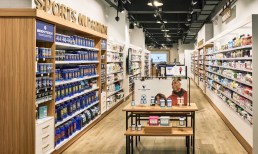Self-service is evolving beyond the kiosk. Essen, Germany-based global discount grocery chain Aldi announced Friday (Oct. 1) that it is testing out computer vision checkout at one of its locations in the Netherlands.
The Utrecht store will undergo a 12-month trial of the technology, provided by Trigo, a Tel Aviv, Israel-based retail technology company. The technology is similar to that of Amazon Go’s “Just Walk Out,” with shoppers checking in at entry by scanning a code on their mobile app, then cameras and sensors tracking the items they pick and charging their accounts when they leave the store.
“The high degree of digitization in the Netherlands means that we are convinced that we have the right climate here to test new technologies like these,” Jan Oostvogels, CEO of Aldi Netherlands, said in a statement. “The testing of this new concept is in line with current developments at ALDI and is in line with the strategy to make shopping as easy as possible, everywhere and for everyone.”
Research from PYMNTS’ report, Today’s Self-Service Shopping Journey: The New Retail Expectation, created in collaboration with Toshiba, finds 80% of in-store shoppers like the idea of nontraditional checkout, about two-thirds of consumers who use self-service checkout at the grocery store say they do so because it is faster than traditional checkout, and about half use it to cut out the waiting in line. By eliminating the friction of ringing up each individual item at a self-checkout kiosk, computer vision solutions such as these maximize the two main drivers of value for self-service options.
Related news: Consumers Want Self-Service Checkout Options But Rarely Get to Use Them
“With frictionless technology, the general public will be able to experience ease of shopping,” Trigo Co-founder and CEO Michael Gabay said, “while retailers will benefit from better inventory control, shrinkage reduction, as well as a positive customer service focus.”
Advertisement: Scroll to Continue
In June, Trigo announced an investment round that brought its total funding to over $100 million, and soon afterward it announced a partnership with Google Cloud to advance its frictionless checkout technology.
Jokr Adds Alcoholic Beverages
Where once on-demand alcoholic beverage delivery was the exclusive purview of a select few eCommerce businesses, the option is becoming increasingly mainstream. DoorDash has added beer, wine and spirits to its marketplace in select areas, and Uber announced early this year its acquisition of alcoholic delivery service Drizly (though the deal is under Federal Trade Commission [FTC] scrutiny).
Read more: The Bring-It-to-Me Economy Comes for Alcoholic Beverages with DoorDash, Uber
Even smaller players are getting onboard. On Thursday (Oct. 7), Jokr, a 15-minute grocery delivery startup that operates in New York and Berlin, announced the addition of alcoholic beverages to its offerings in New York City. Specifically, the delivery service is adding a handful of beer, hard seltzer and hard cider options.
We’d love to be your preferred source for news.
Please add us to your preferred sources list so our news, data and interviews show up in your feed. Thanks!
“What we’re excited about is the chance to change the concept of how people shop,” Jokr Co-founder Zach Dennett said in an interview with Karen Webster in July, following the company’s $170 million Series A fundraise. “We’re seeing customer behavior is very sticky because once [they] stop planning ahead and [they] realize that [they] can just make the grocery choices [they] want the minute [they] want them, it’s kind of hard to go back to that planning.”
In a PYMNTS survey earlier this year, that almost half of the 1,200 respondents reported that they were ordering alcohol for same-day delivery more often now than they did before the pandemic.
See also: No Joke: Jokr’s 15-Minute Grocery Delivery Out To Change Consumer Shopping Habits
FNS Funnels $53M into SNAP Program
The U.S. Department of Agriculture’s Food and Nutrition Service (FNS) announced Wednesday (Oct. 6) the award of almost $53 million, distributed across grants to eight local partners, to benefit the Supplemental Nutrition Assistance Program (SNAP).
Much of this funding will go toward improving the execution of the program. By making it easier for consumers to access these benefits, the FNS is opening up a revenue opportunity for grocers, reducing the friction for shoppers and likely leading to more purchases.
“SNAP represents a critical component of America’s food safety net — and now more than ever, we need to ensure that safety net is well-supported,” FNS administrator Cindy Long said in a statement. “State agencies and their partners are the backbone of the program, and these grants are part of USDA’s commitment to providing them the resources they need to deliver program benefits in a manner that best meets the needs of the people they serve while maximizing program integrity and the use of data.”
In Face of Truck Driver Shortage, Tesco Turns to Trains
At a time when, across the United Kingdom, truck driver shortages are making it difficult for grocers to keep items in stock, Tesco, the country’s largest grocer, has a solution — trains. The company aims to boost its use of rail freight by 40% by the end of the year, The Guardian reported Wednesday (Oct. 6). The company is adding two new trains next month, one of which will bring items from Spain into Scotland.
“This is a fantastic story from a sustainability point of view but it has really come into its own helping our supply chain resilience,” the company’s CEO Ken Murphy said in a statement.

 Add as Preferred Source
Add as Preferred Source



